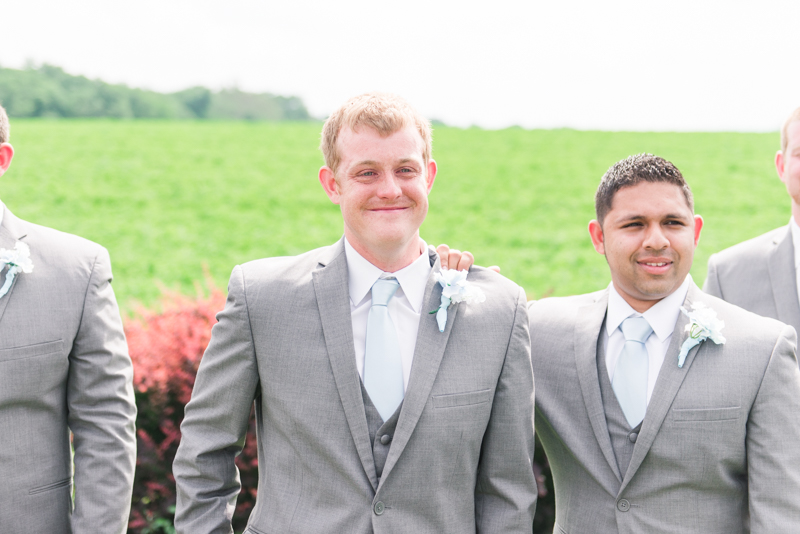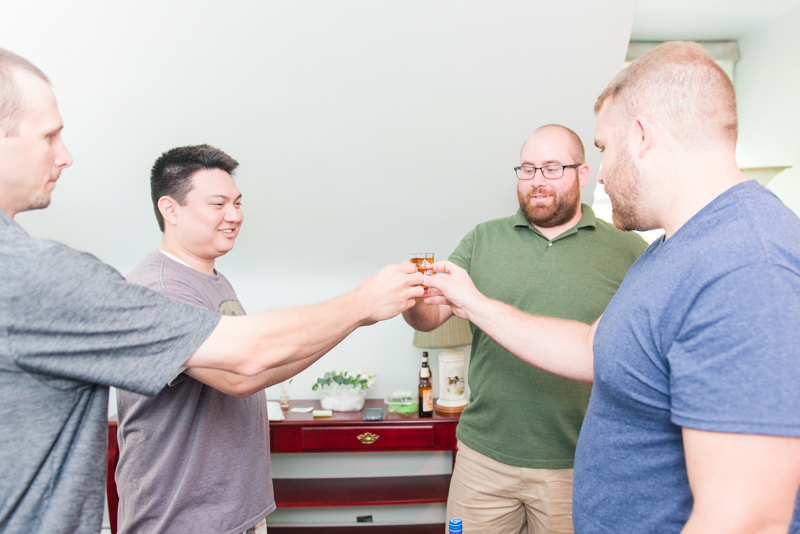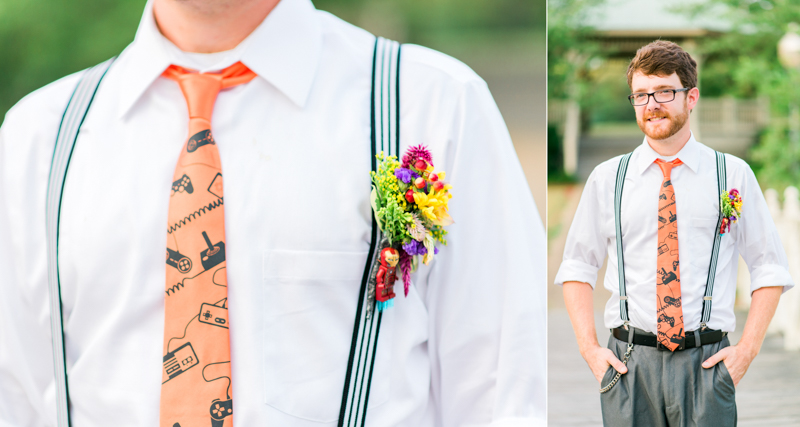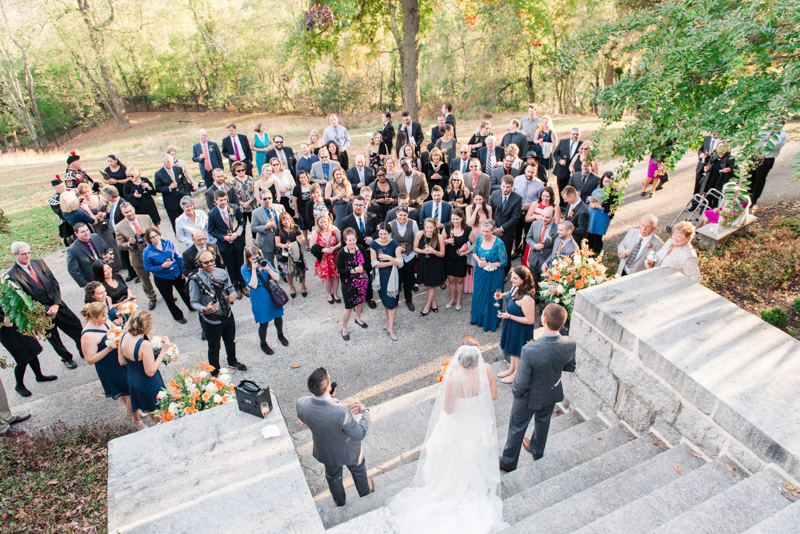Guys, It's Your Day, Too
from Shawn

When it comes to wedding planning, it's no secret that most of it is geared towards the bride. The broad generalization (whether it's true or not) is that the female is the Creative, who has been planning the wedding since she was little, and is the most capable person. Everything involved with the wedding is making these childhood dreams come true, and the guy is just a lucky participant in this occasion. In fact, it seems to be a rule of the universe that most conversations about wedding planning include a passive comment like "It's her day, after all!" It might be the gentleman passing the responsibility of choice to his future wife, or it might be used by an in-law or friend to override an unpopular decision, but Britney and I cringe whenever we hear this phrase.
It gets to be rather demoralizing for a male and helps feed this notion of "her day." Just in the process of our own wedding, I've had these circumstances occur:
- Filling out a form for a wedding expo which asked explicitly for "Bride's Name" but not mine.
- Getting a call from a vendor asking to speak to Britney even though I gave my name and number on the contact list.
- Having my name spelled completely wrong on a form with a potential vendor (they spelled Britney's name correctly).
- Being generally ignored in conversation while vendors make direct eye contact with Britney.
Britney and I worked hard to make sure that this was our wedding (sometimes even choosing to not go with vendors who didn't respect our partnership). Meeting with so many couples, it becomes clear that we aren't the only ones with this opinion. I love when both people are involved in the meeting, either asking us important or interesting questions, or otherwise having thoughts and opinions. Yet some guys we meet seem to prefer to be along for the ride, letting his fiancée make all the conversation.

The "Placeholder Groom"
A placeholder groom refers to a wedding that is purely of the bride's imagination, where the groom could be swapped with a generic male figure at any point without much change to the day. Obviously, the bride would notice if the man wasn't the one she is supposed to marry, but how would it otherwise affect the wedding as a whole? Does the groom have the information and ability to make decisions for his wife that Generic Male couldn't make? Are there vendors who would realize Generic Male isn't the actual groom? Would the decorations not match Generic Male's personality?
Luckily, it doesn't take a lot of work to avoid being a placeholder groom. If your fiancée prefers to handle all the planning, or if you have significantly more going on with work or life, that's okay! The tips below should work for any level of involvement that you and your significant other feel most comfortable with. But I feel they are all a minimum for avoiding "her day" syndrome.

Know What's Going On
As the groom, you're one of the two guests of honor, so having a cursory understanding of the big day is important. It's very easy to relax and let all the decisions happen, but don't just go with the flow without paying attention. Try to stay in the loop with decisions, and make sure you understand why certain ones were made. It makes it much easier later on when - inevitably - things don't go exactly as planned.
The bride's day is usually packed with various activities. The hair and makeup artists are usually splitting time among all the ladies. The dress fitting is usually a big ordeal that requires all hands on deck. And she has to juggle all the vendors with questions regarding the bouquet, the table layout, the decorations, and more. Meanwhile, I've found that the groom and groomsmen usually spend their time posing for photos until they are told to get changed. With this huge disparity in responsibilities, it is almost clearly the logical choice to offload some of the decisions and hassle to the groom. Yet time and time again we've seen vendors choosing to barrage the bride with questions and problems, or grooms who shrug at these difficulties because they don't know what their bride's intent was. This is not always the groom's fault, though, since most of these times he simply was not involved with the decision making to know how to adapt. Not being a placeholder groom means being a reliable decision maker, and that requires having all the information.
For our wedding, I had to stay in the know about what had to happen and why. While Britney was inside getting more beautified, I was outside as the point of contact for all the vendors. I had to make sure all the decorations got put in the correct spot, that the string lights were hung in a way Britney would enjoy, and that any last minute changes to the music were accounted for. When the rain seemed inevitable, I had to make the decision to set up under the greenhouse since I was the one with an eye on the outside. All of this required knowledge of what Brit wanted (especially with decorations, which were mostly her creative vision coming to life), as well as trust that I could handle the dilemmas without shrugging off the vendors. Most importantly, Britney had to trust that I knew enough about the event plans that I could carry it on successfully without having to ask her.

Attend the Meetings - and Be Involved
When we set up meetings, we never assume we will get anything less than both people present and involved. For the most part, we have been very pleased with the success of having the couple both arrive at our meeting space (sometimes there are extenuating circumstances that prevent this, but it's less common). Unfortunately, we also see how many men take a hands-off approach, either intentionally or accidentally. Many times, the groom will sit there quietly while his fiancée takes all the interest, or he'll stare blankly when anyone asks him a question about his preference. I feel this is almost an inevitable byproduct of the wedding culture I've witnessed where the men are secondary to the ladies. Not being involved in the meetings on a personal level is a quick way to become a placeholder groom.
By going to meetings and being involved, you better your understanding of the plans, get answers to any questions you may have, and build confidence with vendors who will then understand that you know what you're talking about.
Even if you feel you have nothing to contribute, ask to share some of the questions your significant other may have. Generate a list of questions to ask your vendor, and split it between the two of you so that both of you are crucial parts of the meeting. Nothing makes us happier about your wedding than knowing you are both really into everything that happens.
Another option is to actually divvy up the vendors you and your partner are responsible for. You likely won't be involved with the dress, hair, or makeup vendors, so take the lead communicating with the DJ, caterer, and photographer. Both of you can be involved and attend meetings together, but it only takes one person to reply to emails or stay updated with a vendor. And since both of you probably have busy lives, splitting the workload makes sense to keep any one person from being overwhelmed. We did this with our own wedding, and it definitely made wedding planning much less stressful.

Contribute!
Planning a wedding is a big deal, and you might feel like your partner is more creative and has it all figured out. Colors are chosen, decorations are picked out, and vendors are emailed Pinterest boards. It is quite daunting to break into the mental flow of a Creative, as I know first hand. Many choices are made with considerations that minds like ours can't comprehend. But that doesn't mean there's no room for input. More than a few times, I have helped make decisions during the planning process that have changed entire plans Britney had formulated, and our wedding turned out better because of it. Speak up if you have an idea, and try to put your mark on the day. If you never provide your own thoughts, the wedding will very quickly start to lose your personal touch, and you'll be more of a placeholder groom.
Sometimes, you might find your ideas getting shut down a lot. It's okay for your partner to not like an idea or think it doesn't fit in with the rest of the day, but those situations usually call for a full conversation. Compromise is essential to a marriage, and it's essential for the wedding day. If you want to play a song you and your friends love but your fiancée hates, try suggesting a song that she could enjoy that you would otherwise say no to. If you want to go golfing the morning of the wedding and she doesn't want you getting sweaty, offer to go to a driving range instead for a few hours. Both of you should be happy with the day you created together, and neither one of you should feel like it was "perfect, except..."

Summary
A wedding is celebrating the union of two people, and both people are equally important. Encouraging the belief that it is "her day" might sound chivalrous, but it's the exact argument the placeholder groom uses to excuse his involvement. A better partner would be inclined to share the work and put in the added effort of being involved, attending meetings, and contributing. As a reminder...
Gentlemen:
- Stay involved with decision making, and understand what your partner also wants.
- Be ready to step in and make changes that need to be made while your wife-to-be is busy.
- Attend meetings and think about questions or concerns (or share in asking questions you both have).
- Know the vendors and be ready to communicate with them if needed.
- Don't be afraid to suggest input for the wedding you would like to see.
- Never believe that is just her day!
Ladies:
- Make sure you let your other half know of decisions, even if you make them alone (preferably, involve them in making decisions!)
- Trust your future husband to make those tough choices when you are busy.
- Get your fiancé to the meetings, and help them feel a part of the conversation.
- Possibly divvy up the vendors between the two of you for who you contact and are responsible for.
- Be accepting of any opinions or suggestions your future husband has.
- Believe that it is his day, too!






